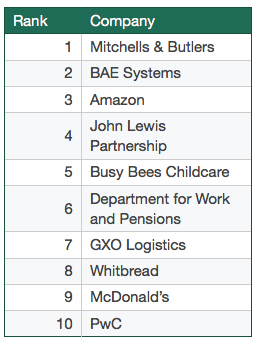Our Latest News
Bottled water giants’ HRD to deliver keynote session at #HrNC26 in May
Bottled water giants’ HRD to deliver keynote session at #HrNC26 in May

Hr NETWORK is delighted to announce that one of the SIX keynote sessions at our ‘TRANSFORMATION THROUGH PEOPLE & TECHNOLOGY’ themed Conference & Exhibition in Edinburgh on Wednesday 13th May will be delivered by Highland Spring Group’s HR Director, John Jarvie.
Highland Spring is the UK’s number one bottled water brand, where over the past four years, the business has grown sales year on year and doubled profit — proving that culture building, when done well, can be a powerful commercial engine. Entitled: ‘Why Culture-Building is Hard Work – and why it’s worth it‘, John will share mistakes made and lessons-learned along the way and why the effort is worth it.
Also delivering Keynote sessions on the day:
-
Kat Gray, Director of Talent & Culture, ASOS
Session Title: Fashioning a Culture for the Future -
Gary Crawford, Chief Advisor/Partner & Rebecca Hastings, Partner, Owendale Advisory – Session Title: How HR Makes – Or Breaks – AI Success
-
Lorraine Mills, Principal Consultant, Right Management – Session Title: To be confirmed
-
Senior HR Leaders Forum Panel – (Panellists to be confirmed)
The Hr NETWORK National Conference & Exhibition will take place on Wednesday 13th May 2026 at the home of Scottish Rugby, the magnificent Murrayfield Stadium.


The delegate booking form for 2026 is NOW OPEN and this is your chance to SAVE £50 on each delegate booking between now and Saturday 28th February 2026 – EARLY BIRD DELEGATE COST: £165+VAT
Please note when the EARLY BIRD booking expires on 28th February, the cost per delegate will increase to £215+VAT.
Employers underestimating impact of Employment Rights Act reforms
Employers underestimating impact of Employment Rights Act reforms

As organisations prepare for the first wave of the single biggest set of changes in employment law in decades, new data from Brightmine reveals that, while HR teams recognise the scale of the reforms required by the Employment Rights Act, many are underestimating the breadth of measures that will reshape the employment landscape.
The majority of surveyed HR professionals (60%) believe that changes to unfair dismissal rules will have the greatest effect on their organisation. However, other substantial reforms taking effect from late 2026, including restrictions on fire and rehire practices, new third-party harassment duties, and enhanced union access rights, will also create major operational, legal and financial implications for employers.
Key areas HR professionals anticipate will impact their organisations:
-
-
60% say unfair dismissal changes will have the biggest impact
-
Statutory sick pay changes concern almost a fifth (18%) of respondents
-
9% point to new trade union rights
-
6% highlight third-party harassment liability
-
4% say fire and rehire reforms will have the greatest effect
-
Stephen Simpson at Brightmine says: “As we move closer to implementation of the Employment Rights Act, HR teams are right to flag unfair dismissal as a major area of change. The reduction of the qualifying period to six months and the removal of the cap on unfair dismissal compensation will significantly increase litigation risk and settlement expectations.
But u
nfair dismissal is only part of the picture. From October 2026, employers will also face stricter limits on fire and rehire, making it automatically unfair to dismiss employees who refuse certain contractual changes. At the same time, new third-party harassment duties will require employers to take all reasonable steps to protect employees from harassment.
Add to this the introduction of union access rights which allows unions to require physical or virtual access to workplaces even where employees are not unionised, the combined effect is that employers will have much less room for manoeuvre than they currently have. These overlapping reforms will reshape day to day HR practice, increase the risk of getting decisions wrong and will require significant preparation throughout 2026.
The key message is clear, employers cannot wait until late 2026 to act. HR teams should be reviewing dismissal procedures, assessing contractual flexibility, strengthening harassment prevention measures, and planning for increased union engagement now. Those who delay risk significant legal and financial consequences.”
The Apprenticeship Revival and the Employers Getting It Right
The Apprenticeship Revival and the Employers Getting It Right
The government has announced a £725m overhaul of skills funding, promising 50,000 extra apprenticeship places in an effort to reverse a decade-long slump that has seen the number of young people starting apprenticeships fall by nearly 40%.
With apprenticeship opportunities expanding, a ranking of the UK’s top apprenticeship employers, compiled in a landmark collaboration between the Department for Education and early careers platform Higherin, places Mitchells & Butlers at the top, outperforming tech giant Amazon and defence contractor BAE Systems.
Oliver Sidwell, career expert and Co-Founder of Higherin , argues: “Apprenticeships today are not what they were twenty years ago. They are no longer seen simply as entry-level training for lower-paid work. Today, apprenticeships exist in fields from software engineering to advanced manufacturing, combining rigorous academic learning with hands-on experience,” he explains.
Part of championing these opportunities means benchmarking the very best through Higherin’s annual ranking of the top apprenticeship employers. “We collect honest reviews from apprentices nationwide to identify employers that truly invest in their people,” he highlights.
Why hospitality outpaces traditional powerhouses
Mitchells & Butlers’ victory reflects the sector’s transformation to a sophisticated training provider. The hospitality group, which operates household names including Toby Carvery, Miller & Carter, and All Bar One, achieved an exceptional 98% apprentice satisfaction rating. The company’s approach centres on what they call “progressive responsibility”. Apprentices take on meaningful roles from day one, with structured pathways that can lead to general management within 3-4 years.

Defence giant BAE Systems proves engineering appeal
BAE Systems’ second-place finish demonstrates the continued strength of engineering apprenticeships, particularly in high-tech manufacturing. Operating across 40 countries, the company offers apprentices exposure to cutting-edge projects from fighter jets to cybersecurity systems.
The company’s apprenticeship-to-engineer pipeline has become increasingly attractive as university costs soar, with many programs offering degree-level qualifications alongside hands-on experience.
Amazon’s apprenticeships bypass traditional tech recruiting
Amazon’s third-place ranking reflects the tech giant’s serious investment in alternatives to computer science degrees. Their apprenticeship programs span software development, cloud computing, and data analysis, all of which are traditionally degree-only territories.
How rankings were awarded – real feedback, real impact
The rankings were determined using five key factors that measure both apprenticeship quality and employer commitment:
-
Amount: Total number of apprenticeship opportunities and levels offered by the employer
-
Started: Total number of apprentices that started their apprenticeship this year
-
Completed: Number of apprentices who successfully achieved their apprenticeship this year
-
Diversity: Diversity of the apprenticeship cohort
-
Reviews: Quality and number of reviews submitted by apprentices
Top Ten Employers for Apprentices:

The rankings go beyond simple satisfaction scores, assessing employers on the scale of opportunities they offer, completion rates, and the diversity of their apprentices. By combining hard metrics with the voices of apprentices themselves, the methodology highlights organisations that are genuinely committed to developing young talent.
What do students really want?
Analysis reveals clear patterns in top-performing employers:
Winners focus on:
-
Structured progression pathways with clear milestones
-
Meaningful work from day one, not just observation
-
Strong mentor relationships with dedicated time
-
Mix of formal qualifications and practical skills
-
Cross-department exposure and networking
Common failures:
-
Using apprentices as cheap labour without genuine development
-
Inadequate mentor training and support
-
Unclear progression routes beyond initial qualification
-
Isolation from broader company culture and opportunities
Advice for Prospective Apprentices
Oliver recommends focusing on employers that score highly on development factors rather than just brand recognition: “The best apprenticeship is one where you’ll gain skills employers actually want, with clear paths to progress. The highest-rated employers understand this and create schemes where apprentices gain genuine business experience alongside their qualifications.”
For employers, the message emphasises genuine investment over marketing promises: “Apprentices are hugely motivated. They research thoroughly and share experiences widely. Companies that treat apprenticeships as strategic talent development will attract the best candidates. Those who see them as cheap labour will struggle.”
OUT TODAY – JANUARY 2026 Issue of Hr NETWORK Magazine
OUT TODAY – JANUARY 2026 Issue of Hr NETWORK Magazine
SIGN IN/SIGN UP TO Hr NETWORK HUB TO READ ALL OUR MAGAZINE ISSUES…
The True Colours of Transformation: Why People-Powered Technology?
Like a chameleon adapting to its environment, HR must blend technology with valued human contribution. Automation may promise efficiency and innovation, but its true power emerges when people are involved. Technology may set the pace, but people set the direction. Andy Moore examines why a human-centered approach to technology is vital in 2026 and beyond.
Also in the latest issue:
- Announcing the WINNERS for Hr NETWORK National Awards 2025 in partnership with Alvarez & Marsal
- SPECIAL FEATURE: The Role of HR in Tackling Modern Slavery
- The regular sections of the magazine include: News, STATS and EXTRA
- The ‘Insights’ section features first class comment from those in the know on a range of subjects including: whistleblowing training; Managing off-payroll risk
Click the front cover below to read the latest issue:
Hr NETWORK ‘TRANSFORMATION THROUGH PEOPLE & TECHNOLOGY’ Conference & Exhibition 2026
Hr NETWORK ‘TRANSFORMATION THROUGH PEOPLE & TECHNOLOGY’ Conference & Exhibition 2026
The Hr NETWORK National Conference & Exhibition will take place on Wednesday 13th May 2026 at the home of Scottish Rugby, the magnificent BT Murrayfield Stadium.
 Following a hugely successful Conference & Exhibition in May 2025, followed by the incredible reaction from Sponsors & Guests at our recent Hr NETWORK National Awards Gala Dinner at the Hilton Glasgow on 13th November 2025, we are delighted to announce details for the forthcoming and hugely anticipated annual Hr NETWORK’ TRANSFORMATION THROUGH PEOPLE & TECHNOLOGY ’ Conference & Exhibition 2026.
Following a hugely successful Conference & Exhibition in May 2025, followed by the incredible reaction from Sponsors & Guests at our recent Hr NETWORK National Awards Gala Dinner at the Hilton Glasgow on 13th November 2025, we are delighted to announce details for the forthcoming and hugely anticipated annual Hr NETWORK’ TRANSFORMATION THROUGH PEOPLE & TECHNOLOGY ’ Conference & Exhibition 2026.
The delegate booking form for 2026 is NOW OPEN and this is your chance to SAVE £50 on each booking made between now and Saturday 28th February 2026 – EARLY BIRD DELEGATE COST: £165+VAT
Please note when the EARLY BIRD booking expires on 28th February, the cost per delegate will increase to £215+VAT.
Younger employees driving office return as older colleagues remain reluctant to turn backs on WFH
Younger employees driving office return as older colleagues remain reluctant to turn backs on WFH
 Younger employees are more likely to embrace office working than their older colleagues, with three in ten (29%) employers admitting that under 30s are the least likely to have an issue with returning to the office. The new research by Epassi UK, the all-in-one benefits hub, as part of its Employee Benefits Report 2025, finds that a fifth (20%) of businesses say that employees under the age of 30 come into the office more frequently than required.
Younger employees are more likely to embrace office working than their older colleagues, with three in ten (29%) employers admitting that under 30s are the least likely to have an issue with returning to the office. The new research by Epassi UK, the all-in-one benefits hub, as part of its Employee Benefits Report 2025, finds that a fifth (20%) of businesses say that employees under the age of 30 come into the office more frequently than required.
Hybrid working remains one of the most in-demand perks amongst employees – nearly nine in ten (86%) say it is what they value most about their job, as it makes them feel happier, and more productive. For example, three quarters (74%) of all employees say that when they work from home, they tend to do more work as they have no commuting time.
ONS figures show that 9.5 million people in the UK were hybrid working earlier this year. However, many employers – particularly major employers in the tech, financial and legal sector – are beginning to move away from mixed working styles and instead, are mandating returns to the office.
While nine in ten (87%) employers currently allow their employees to work from home, a quarter (27%) admit they have changed their policies within the last year, requiring staff to come into the office more.
Employees are feeling this shift – half (52%) of employees say their employer has changed their attitude to working from home policies in the last year, rising to six in ten (59%) younger employees. Half (51%) feel as though their employer favours those who come into the office more often.
As a result of policy changes, a fifth (20%) of businesses have already admitted that requiring workers to be in the office more has resulted in employees quitting. This sentiment is equally reflected by employees – seven in ten (70%) workers say they’d consider leaving their current job for one that offers hybrid working if their employer changed their current working from home policy.
Younger employees are more likely to embrace office working than their older colleagues, with three in ten (29%) employers admitting that under 30s are the least likely to have an issue with returning to the office. The new research by Epassi UK, the all-in-one benefits hub, as part of its Employee Benefits Report 2025, finds that a fifth (20%) of businesses say that employees under the age of 30 come into the office more frequently than required.
Hybrid working remains one of the most in-demand perks amongst employees – nearly nine in ten (86%) say it is what they value most about their job, as it makes them feel happier, and more productive. For example, three quarters (74%) of all employees say that when they work from home, they tend to do more work as they have no commuting time.
ONS figures show that 9.5 million people in the UK were hybrid working earlier this year. However, many employers – particularly major employers in the tech, financial and legal sector – are beginning to move away from mixed working styles and instead, are mandating returns to the office.
While nine in ten (87%) employers currently allow their employees to work from home, a quarter (27%) admit they have changed their policies within the last year, requiring staff to come into the office more.
Employees are feeling this shift – half (52%) of employees say their employer has changed their attitude to working from home policies in the last year, rising to six in ten (59%) younger employees. Half (51%) feel as though their employer favours those who come into the office more often.
As a result of policy changes, a fifth (20%) of businesses have already admitted that requiring workers to be in the office more has resulted in employees quitting. This sentiment is equally reflected by employees – seven in ten (70%) workers say they’d consider leaving their current job for one that offers hybrid working if their employer changed their current working from home policy.








